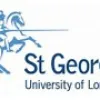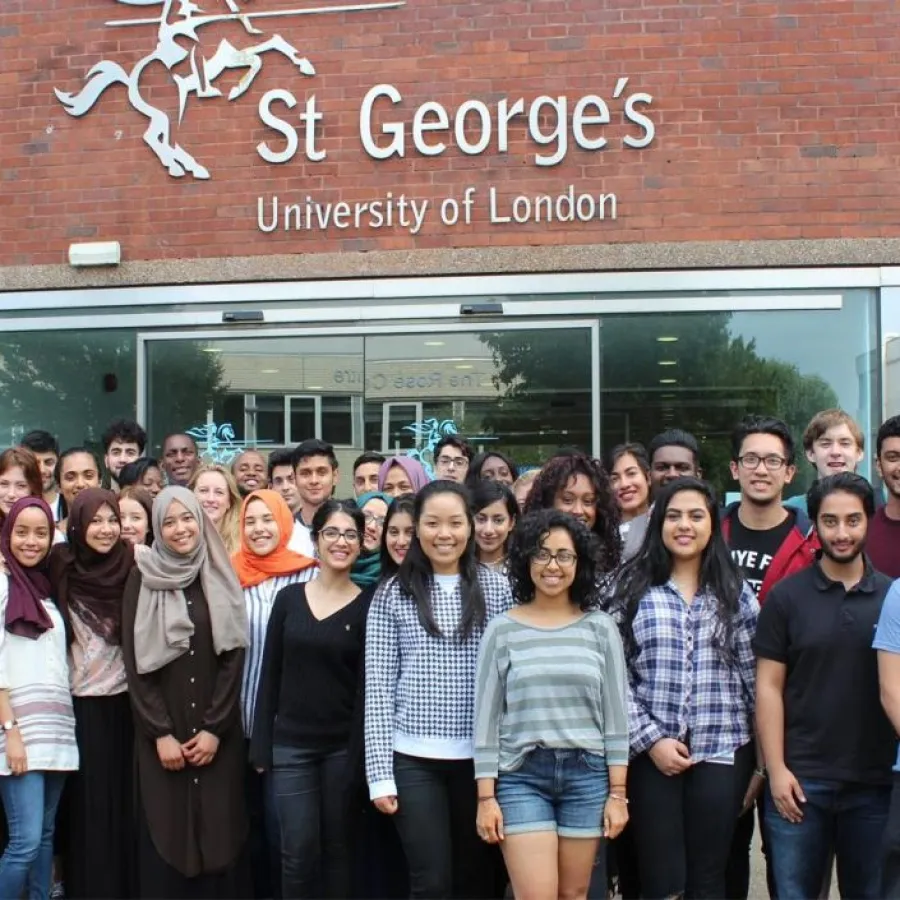St George University


St George University
The University of London is the UK’s leading provider of digital and blended distance education internationally, offering programs to 45,000 students in 190 countries around the world. Although proudly rooted in London, our community and impact are global. We are a national leader in the humanities, and we promote their value to society and the economy through knowledge creation and exchange. We are also a federation of 17 esteemed higher education institutions, with collaboration at the heart of our ethos. The University of London Federation is a collective community of more than 240,000 learners and 50,000 staff, delivering world-leading research across all disciplines. Our passion for increasing access to education and mobilizing the collective power and expertise of the federation is central to our ability to transform lives around the world and address the global challenges of the future.
Description
Research & Enterprise
We will pursue a culture of research excellence based on collaboration, which rewards innovation and promotes equal opportunities.
We will increase our research volume and income by 50% (compared to 2022).
We will provide an outstanding environment in which to undertake research with integrated research support services and specialist facilities.
We will develop our knowledge exchange activities to ensure that our research and knowledge have the greatest possible impact.
Education & Student Experience
We will shape an enriching academic experience centered on research, practice, and professionalism that equips graduates to have a positive impact on the world.
We will create an outstanding environment for student learning and development within a supportive University community.
We will expand our Education portfolio, diversify our offer, and increase our international reach.
Courses
Bsc Clinical Pharmacology
St George University
United Kingdom, United Kingdom
Attribute
Undergraduate diploma (or higher)
The entry qualification documents are accepted in the following languages: English.
Often you can get a suitable transcript from your school. If this is not the case, you will need official translations along with verified copies of the original.
You must take the original entry qualification documents along with you when you finally go to the university.
English
At least 2 reference(s) should be provided.
Application fee 200 Euro
Career opportunities
Industry-focused and to get you work-ready on graduation, our Clinical Pharmacology degree encompasses a broad spectrum of concepts and solutions – from understanding disease processes and identification of potential new drug targets to organizing and running clinical trials, drug regulation, and use in patients.
It has been purposefully designed with input from employers to ensure you develop the general and specialist skills they require, helping you stand out in the job market. Throughout the course, you will develop transferrable skills, including oral and poster presentation, scientific writing, teamwork and peer observation, and essential clinical and laboratory skills. Your competence in these will be recognized by an accumulation of badges, which you can share – for example on a LinkedIn profile – to demonstrate your skills to employers.
Every step of your learning journey offers exciting employment possibilities, however, the six-week placement we provide every student in Year 2 provides particularly valuable workplace experience, making you highly attractive to employers. We work with dozens of small and large companies which span the full gamut of sector activities, including regulatory writing and clinical project management (e.g. Niche Pharmaceuticals), preclinical and clinical lab services (e.g. Charles River), regulatory affairs (e.g. DLRC) or medical communications (Chameleon).
Throughout the course, you will also learn about the culture and wide range of activities encompassed by Clinical Pharmacology from experts working in the pharmaceutical industry, healthcare, academia, and regulation. Recent external contributors to the course include Dr. David Carlisle (Clinical Pharmacologist, Roche Pharmaceuticals), Dr Edd Humphries (Senior Research Scientist, Astra Zeneca), Dr Mark Bruce (Senior Director, Head of Translational Science and Drug Safety, ONO PHARMA UK), Chloe Bryan (Senior Clinical Research Associate, Quality Regulatory and Clinical Consultancy, Cambridge), Tim Hardman (Managing Director, Niche Science and Technology). External speakers contribute to module lectures e.g. on pharmacokinetics, drug development, drugs in healthcare, and through careers talks and panels.
After completing your degree you could go on to work in the pharmaceutical and biotechnology industry, managing drug trials working in the laboratory for one of the many pharmaceutical companies or contract research organizations, or assisting with research and testing medicines on patients in clinical trial units, hospitals or GP practices. Potential employers include the NHS and many professional and regulatory organizations, such as the National Institute for Health and Care Excellence (NICE) or the Medicines and Healthcare Products Regulatory Agency (MHRA).
Alternatively, you could follow an academic route: teaching or researching disease mechanisms and identifying treatment targets for new medicines; or seek employment in the fields of scientific publishing, journalism, marketing, and sales.
For more information on the range of career options, download our Clinical Pharmacology careers brochure (PDF). Should you wish to undertake further study or research at St George’s, you will be well equipped to apply for graduate-entry programs, such as medicine or pharmacy.
Careers
Academia (teaching or research)
Bioanalytical company
Biomedical company
Biotechnical company
Clinical trials unit – industry or healthcare
Contract research organization
Large pharmaceutical company
Publications house
Regulatory affairs
Biomedical Science - Reproduction and Development MRes
St George University
United Kingdom, United Kingdom
Attribute
Undergraduate diploma (or higher)
The entry qualification documents are accepted in the following languages: English.
Often you can get a suitable transcript from your school. If this is not the case, you will need official translations along with verified copies of the original.
You must take the original entry qualification documents along with you when you finally go to the university.
English
Application fee 200 Euro
Career opportunities
The course provides excellent preparation for Ph.D. study, which around a fifth of our students complete here at St George’s or elsewhere, and this can lead to a research career within academia or pharmaceutical industry.
Alternatively, on completion, you could pursue a career in the biomedical and medical sector in roles where some research background is required but not necessarily at PhD level. This may include job opportunities as research support staff, technicians, medical laboratory assistants, specialist services provision, equipment operators, and laboratory management.
This course is also effective in accelerating the development of your career in healthcare and NHS.
Clinical Genomics MSc
St George University
United Kingdom, United Kingdom
Attribute
High school / secondary education (or higher)
The entry qualification documents are accepted in the following languages: English.
Often you can get a suitable transcript from your school. If this is not the case, you will need official translations along with verified copies of the original.
You must take the original entry qualification documents along with you when you finally go to the university.
English
Application fee 200 Euro
Clinical interpretation of genomic data
You will learn how to analyze the key features of a genetic variant that affect the prior likelihood of pathogenicity. You will understand how to critically examine the clinical context within which a genetic variant will be interpreted. This module will teach you how to apply in silico variant analysis tools to evaluate genetic variants, equipping you with the skills to critically evaluate the report generated by in silico variant analysis tools. By the end of the module you will be able to demonstrate the interrogation of population level genomic databases to a specific genetic variant alongside the interrogation of mutation databases with respect.
(Delivered at St George’s)
Communication of genetic information and ethics
This module will teach you how to communicate effectively and sensitively to patients and their families about complex genetic data and variants of unknown significance. It will allow you to critically evaluate the ethical issues surrounding consent for genetic testing with an understanding and explanation of incidental findings. You will evaluate the ethical considerations of genetic testing and be able to formulate cogent arguments for and against testing in specific clinical scenarios.
(Delivered at St George’s)
Personal and professional development portfolio
In this module you will assemble a portfolio that demonstrates learning and progression in the application of genetic technologies, the interpretation of genomic data, and the communication of complex genetic information to patients. You will demonstrate the application of the approaches undertaken in the clinical interpretation of genomic data, and will critically appraise the medical literature relevant to the interpretation of genetic data. Alongside this you will reflect on the effect of genetic test results on the patient and other healthcare professionals and your communication skills when imparting complex genetic information to patients/families and directed literature. You will finally propose and justify your approaches to continuing professional development.
Global Health and Humanities
St George University
United Kingdom, United Kingdom
Attribute
Undergraduate diploma (or higher)
English
At least 2 reference(s) should be provided.
Application fee 200 Euro
As well as a degree covering the broad subject of global health, we offer five themed degree pathways in the following specialist areas: Global Health and Conflict; Global Health and Humanities; Global Health and Mental Health; Global Health, Ethics and Law; and Global Health, Infection and Immunity.
By designing the suite as a series of related but independent modules, we can deliver a highly flexible programme allowing you to tailor your studies to match your interests and career aspirations. You can also accrue the appropriate amount of credits to achieve the intermediate awards of Postgraduate Certificate (PgCert) or Postgraduate Diploma (PgDip), building on each qualification over time to achieve your full master’s degree.
The MSc is made up of 180 credits and can be studied over one year full-time or two years part-time. You will study one compulsory module common to all pathways, Global Governance for Health one elective module linked to your chosen pathway, and choose one of three research support modules. You will undertake a research project on a topic linked to your themed degree and choose a number of additional modules from a list of eight optional modules depending on how much credit you need to complete.
To achieve the PgCert (60 credits), you must study the compulsory module and choose additional modules to the value of 45 credits. For the PgDip (120 credits), in addition to the compulsory module, you must choose additional modules to the value of 105 credits.
Module availability
It is possible that certain modules listed on the course page may not be able to run due to a variety of reasons, such as the availability of specialist academics or patterns of student demand, including limitations due to minimum or maximum class sizes. The University will ensure that all affected parties are notified of any changes as soon as possible and propose relevant alternative options if necessary.
View all
Global Governance for Health (15 credits)
Global Health Humanities (15 credits)
Research project (60 credits)
Research support modules
If you are studying a full MSc, you may choose the following module to help you prepare for your research project.
Research methods (15 credits)
Optional modules
Depending on the amount of credits needed, you will choose from the list of optional modules below.
Antimicrobial Resistance (AMR) (30 credits)*
Conflict and Catastrophe Medicine (30 credits)
Culture and Mental Health (15 credits)
Global Environmental Health and Climate Change (30 credits)
Global Health Ethics and Law (30 credits)
Global Health and Comparative Health Systems (15 credits)
Global Health Diseases (30 credits)
Global Public Health Challenges (30 credits)
Humanitarian Action and Ethics (15 credits)
Infection and Immunity (30 credits)*
Migration and Health (15 credits)
Biomedical Science - Antimicrobial Resistance MRes
St George University
United Kingdom, United Kingdom
Attribute
High school / secondary education (or higher)
The entry qualification documents are accepted in the following languages: English.
Often you can get a suitable transcript from your school. If this is not the case, you will need official translations along with verified copies of the original.
You must take the original entry qualification documents along with you when you finally go to the university.
English
Application fee 200 Euro
Career opportunities
The course provides excellent preparation for PhD study, which around a fifth of our students complete here at St George’s or elsewhere, and this can lead to a research career within academia or the pharmaceutical industry.
Alternatively, on completion, you could pursue a career in the biomedical and medical sector in roles where some research background is required but not necessarily at PhD level. This may include job opportunities as research support staff, technicians, medical laboratory assistants, specialist services provision, equipment operators, and laboratory management.
This course is also effective in accelerating the development of your career in healthcare and NHS.
MSC Genomic medicine
St George University
United Kingdom, United Kingdom
Attribute
Undergraduate diploma (or higher)
English
At least 2 reference(s) should be provided.
Application fee 200 Euro
Career opportunities
The MSc is designed to provide a solid introduction to the key areas of genomics, human genetics, and genetic variation, including an understanding of disease genetics and how genomic medicine can illuminate disease mechanisms and biology. You will examine the range of ‘omic’ technologies: their interpretation and application in key areas of healthcare such as cancer, rare inherited diseases and infectious diseases, as well as research.
With the development of bioinformatics now playing such a crucial role, you will gain sufficient knowledge and understanding required to critically interpret existing genomic research and develop the skills to collect, analyze, and interpret data using a range of statistical and bioinformatics techniques.
As a key part of the MSc course, you will get the opportunity to develop research skills by conducting a 60-credit laboratory/computer research project or a 30-credit literature review. Many of our part-time students choose a project that can be incorporated into their work, such as the genetic analysis of particular patient samples. Others have studied diverse topics such as neurological genetic disease or patients with tuberculosis. One recent student conducted a project on how genomic education could be incorporated into and benefit midwife training.
MSc Genomic Medicine has been structured to provide options to study for PgCert and PgDip awards, as well as the MSc. At the PgDip level, we offer two study routes (Option 1 and 2), which enable you to focus on cancer, pharmacogenomics, and infectious or inherited diseases. At the PgCert level, we offer four different pathways:
Genomic Medicine (Standard): The majority of PgCert students follow the Standard pathway as it includes the core elements of the MSc program.
Genomic Medicine (Medical): If you already have significant knowledge of genomics, this pathway allows you to opt out of the Fundamentals of Human Genetics and Genomics module.
Genomic Medicine (Bioinformatics): This pathway is ideal for those with an interest in big data and data handling.
Genomic Healthcare: This pathway of core modules has been designed based on feedback from our clinical students, including nurses, and is based on the content most helpful to their daily work.
Our wide range of specialist modules can also be studied individually as part of Continuous Personal and Professional Development (CPPD). If you work in the NHS our modules are available with or without assessment, fully funded by HEE as part of your ‘workforce development’ (subject to available commissions). In recent years, a broad range of health professionals have chosen to study with us, including GPs, surgeons, consultants, research nurses, genetic technologists, and biomedical scientists.
Biomedical Science - Molecular Mechanisms of Cancer MRes
St George University
United Kingdom, United Kingdom
Attribute
High school / secondary education (or higher)
The entry qualification documents are accepted in the following languages: English.
Often you can get a suitable transcript from your school. If this is not the case, you will need official translations along with verified copies of the original.
You must take the original entry qualification documents along with you when you finally go to the university.
English
Application Fee 200 Euro
Career opportunities
The course provides excellent preparation for Ph.D. study, which around a fifth of our students complete here at St George’s or elsewhere, and this can lead to a research career within academia or pharmaceutical industry.
Alternatively, on completion, you could pursue a career in the biomedical and medical sector in roles where some research background is required but not necessarily at PhD level. This may include job opportunities as research support staff, technicians, medical laboratory assistants, specialist services provision, equipment operators and laboratory management.
This course is also effective in accelerating the development of your career in healthcare and NHS.
Contact Hetdynamic Ltd now for
Guidance
Apply for St George University

